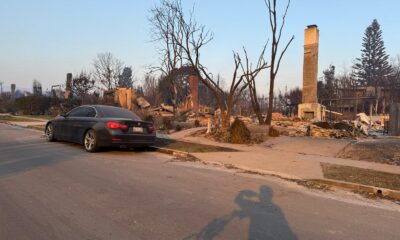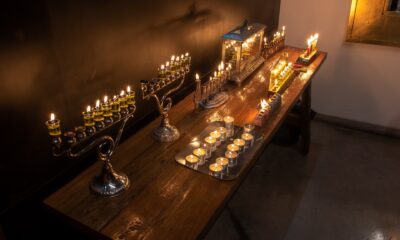
Personal Story

Smoke clears on LA’s cacophony of errors
The Los Angeles (LA) fires began on 7 January 2025 on a day when residents had been warned of “extreme” winds that could cause life-threatening conditions and wildfire. These winds were to be stronger than the typical Santa Ana winds – a winter phenomenon, typically milder than the Cape southeaster in South Africa. They were accelerated by an intense jet stream from the north at high altitude. Gusts on nearby mountaintops were to reach up to 100 mph (160 km/h).
Many of us prepared by taking down anything outside that could break or blow away. I lowered the American flag that flies above my front door, for example, but our mayor, Karen Bass, wasn’t preparing for the emergency. Instead, she had chosen that week to visit Accra, Ghana, as part of a national delegation to that country’s presidential inauguration, an event that had little appeal or relevance to anyone in LA. She was overseas when the fires began to burn.
At about 10:30, a fire was reported near the top of the Pacific Palisades, a neighbourhood that stretches upwards from the shore of the Pacific Ocean to the crest of the Santa Monica mountains. Local residents, myself included, now believe that the fire emerged from the burn scar of a previous fire that ignited on New Year’s Eve, when some hikers fired illegal fireworks. In calm conditions, firefighters put out the blaze easily, but it may have left smouldering embers.
Later that same day, a separate fire erupted near the town of Altadena, in the foothills above the city of Pasadena, on the opposite, eastern side of LA. The cause has yet to be determined, but may have been the exposed power lines that California, despite being the fifth-largest economy in the world, has yet to bury. It wouldn’t have been the first time that high winds have caused towers to fall and cables to snap, sparking wildfires below.
The speed with which the Palisades fire spread in high winds is reflected in the text messages my wife and I received that morning from our nanny, who was taking our infant son for a walk. At 10:42, 12 minutes after the blaze was first sighted, she wrote, “There’s a fire somewhere. We can smell the smoke. You will see it outside.” Having covered fires before, I knew the danger. I responded, “Julia we should check it out and pack bags if necessary.”
I returned home from where I had been working, and we packed quickly. My wife walked to the local public elementary school, literally next door, to retrieve our elder son. There, she and other parents were delayed by bureaucrats who insisted that they fill out forms to excuse the children’s absences. Meanwhile, a column of smoke was billowing closer and closer. Finally, Julia returned, and we were able to leave. I still imagined we might be back by the evening.
As we turned onto the main road, Sunset Boulevard, we found an immense traffic jam had begun. We decided to take a shortcut through a private driveway to the coastal highway. Shortly after noon, the fire department sent the order to evacuate, via cellphone. We had already left. Others, less agile or less fortunate, were stuck on Sunset: many abandoned their cars and fled on foot as the smoke was driven coastward by the freakishly strong wind.
As we continued south on the road, I thought of the passage we had just read in Genesis: “And let your eye not pity your possessions…” (45:20). I made my peace, quietly, with the idea that we would lose our home. I wasn’t too worried: we had fire insurance, unlike some neighbours who had lost theirs after the State of California, in an ill-advised experiment in socialism, had capped the cost, resulting in the departure of insurance companies and policies from the state.
The winds howled all night. Security camera footage from the now-destroyed homes of friends and neighbours shows a relentless shower of fiery embers, engulfing all in their path. By the next day, the winds were slightly calmer and authorities had begun allowing journalists into portions of the burn zone to cover the damage. I was lucky to have taken my press pass with me. I drove back northward into the smoke, and found that our home was still, miraculously, there.
Apparently, the house had been protected by a wall of Ficus trees that ruined our view but which I had refused to cut down because they formed a natural windbreak. I also found our garden hose stretched across the lawn: a Good Samaritan had used it to extinguish a fire on our now-melted vinyl fence, while there was water pressure. Other portions of the fence, and my neighbour’s yard, were ablaze: I used buckets of water from a gutter to douse the flames.
There was no use trying to save the rest of the neighbourhood. Overnight, almost all of the other homes had been destroyed. Flames leapt from the windows of the few that were left. As smoke from the burning school blew towards me, I left and spent the rest of the day covering the fire elsewhere. I couldn’t know whether my house would survive another night of fiery wind. I had, at least, been afforded the privilege of defending it. Ultimately, it stood, smoky but intact.
The Palisades Fire and the Eaton Fire, as the Altadena blaze became known, will be studied as a cacophony of errors by state and local government, not the least of which was the 20-minute delay before firefighters arrived on the scene. But there’s also solace in the experience of neighbour helping neighbour, which lives on in the WhatsApp groups that are a lifeline for our communities, still evacuated. We are the “bush that burns but is not consumed”. (Exodus 3:2)
- South African-born Joel Pollak is the senior editor-at-large and in-house counsel at Breitbart News and hosts Breitbart News Sunday. He is a Harvard graduate with high honours in social science and public policy and a law degree. He was once then leader of the Democratic Alliance, Tony Leon’s speechwriter and has a master of Arts in Jewish Studies. Pollak has written several books, including How Trump Won: The Inside Story of a Revolution, and The Agenda: What Trump Should Do in His First 100 Days.











yitzchak
January 25, 2025 at 6:39 am
2 omissions here”;\
1) Why were reservoirs empty or neglected ,(insinuations/conspiracies have arisen targeting certain individuals in the farming community .?
2) IN CT sea water has been used . One to put out the fires and secondly if NaCL is toxic to the underbrush so be it….Like the Cape ,where fire breaks are so necessary.